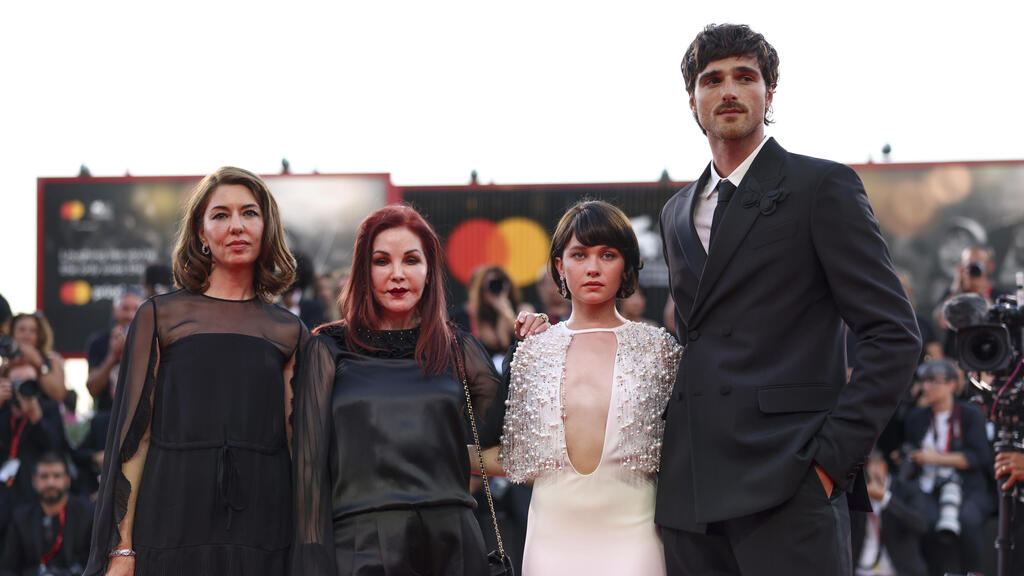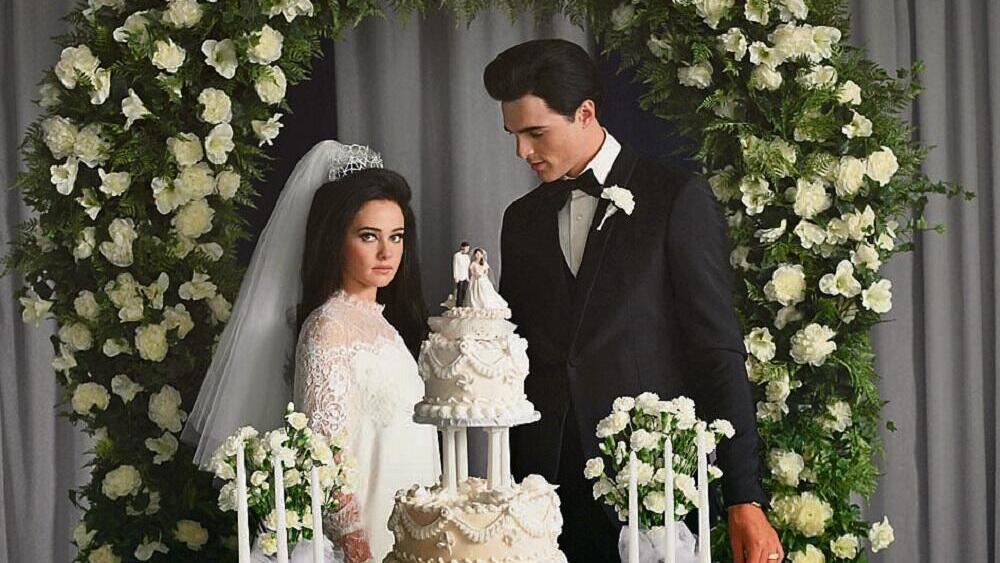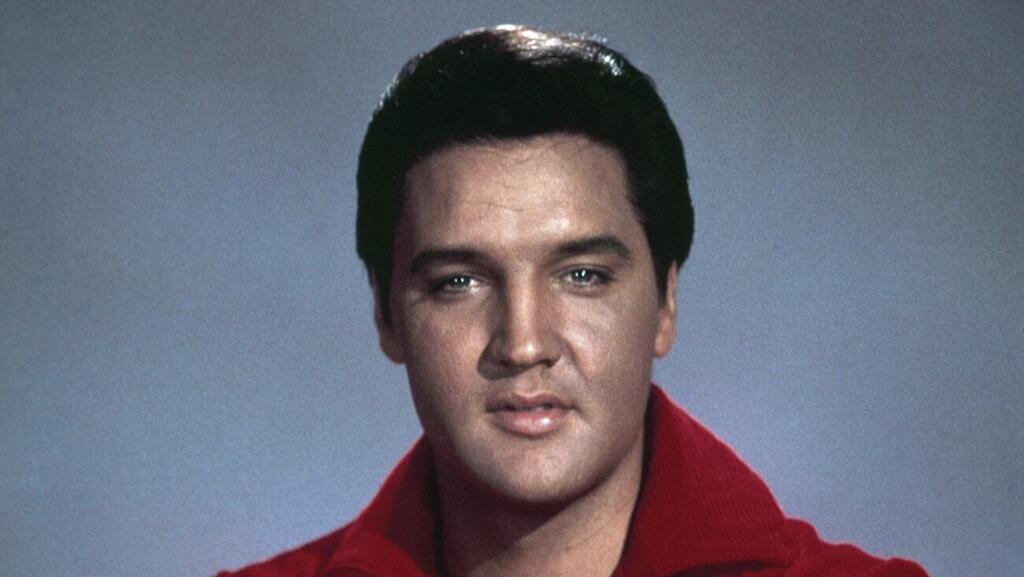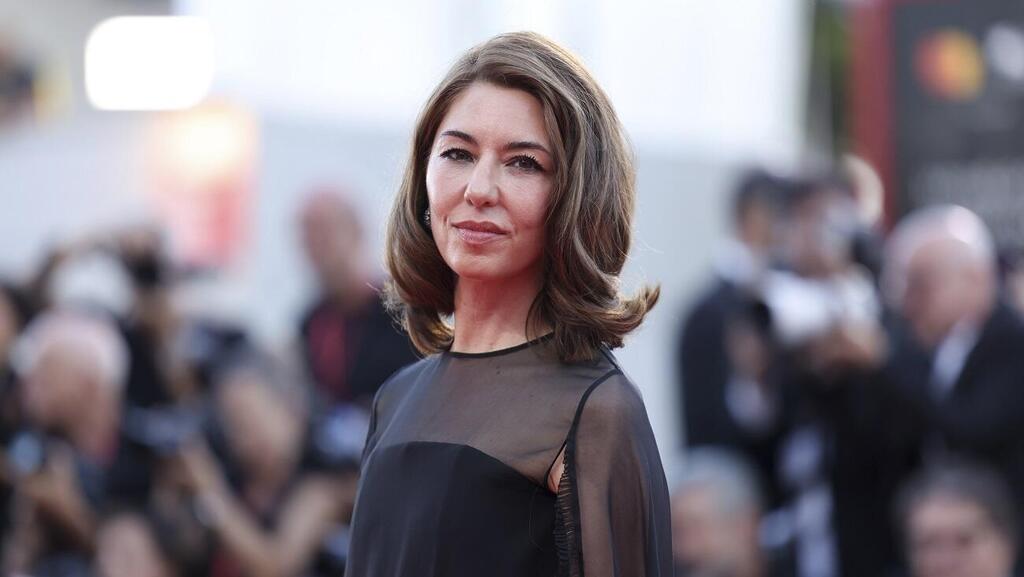Getting your Trinity Audio player ready...
During the press conference for the movie "Priscilla" at the Venice Film Festival, a woman with red hair stood before the audience and the cast. She was Priscilla Presley, the former wife of Elvis Presley, who had only a few months earlier lost their shared daughter, Lisa Marie Presley.
Read more:
"It's very difficult to sit and watch a movie about yourself, about your life, about your love," Priscilla said in a trembling voice, tears welling up. "Sophia Coppola, the director, did an amazing job. We spoke a couple of times, and I really gave her everything I could."
4 View gallery


Sophia Coppola, Priscilla Presley, Cailee Spaeny, Jacob Elordi
(Photo: Vianney Le Caer/Invision/AP)
Coppola was well aware of Priscilla's emotional struggles. She deeply appreciated her assistance. "Priscilla is a good person and didn't seek to have a movie made about her. I approached her," she explains. "I know she was very anxious about the project."
How did you manage to convince her?
"Priscilla said that because she loves my films, she trusted me to be sensitive. I was extremely fortunate to be able to work with Priscilla and ask her questions. She was kind and open enough to try and help me answer them as best she could - even just so that I would have all the details, so we could be as accurate as possible."
What did she say when she saw the film?
"I was really nervous to show her the film for the first time. We watched it, and she said that I did my homework properly. I was relieved because it was very important to me that she would be satisfied with the film and feel that her story was given the proper respect."
Copolla could already be satisfied for another reason. "Priscilla," which premiered in theaters, competed for the Golden Lion and awarded the lead actress, Cailee Spaeny, with the Best Actress award. It wasn't easy for Copolla to present their love story from the early 1960s at this time. Priscilla, the daughter of a widowed pilot who remarried an officer in the American Air Force, was 14. They met at a military base in Germany, where her step-father served with Elvis, who was a decade older than her.
They moved to Graceland, his magnificent estate in Memphis until they got married in 1967. "It was very difficult for my parents to understand why Elvis was so interested in me," Priscilla confessed in Venice. "I truly think it came from being a good listener. Elvis, on the other hand, poured out his heart to me. For example, in Germany, he exposed his fears and hopes, and also the difficulty of coping with the loss of his mother (who was an alcoholic and died at the same time from liver disease), which he never managed to overcome," she said.
"I was the one who truly listened and comforted him - that was the essence of our connection. Although I was 14, I was more mature in spirit, and that was the attraction between us. When Elvis returned to the U.S., he called me and talked about his troubles and how frustrated he was with what was happening in his film career."
The openness regarding the relationship from Priscilla's point of view is evident. "People think, It was all about sex, but it really wasn't. In those years, I didn't sleep with him. Elvis was very kind, very gentle, very loving. He also respected the fact that I was only 14. Over the years, we built a relationship that lasted until I left him, and it wasn't because I didn't love him - he was the love of my life - it was his lifestyle that was so difficult for me."
The clear discomfort this connection evokes and the questions it raises about Elvis's nature don't trouble Coppola. "The fact that they didn't consummate their relationship until the eve of their wedding when she was 21, is something Priscilla always emphasized. So, I'm not a psychologist, but it definitely seems like Elvis had issues surrounding the loss of his mother. So, for him, this girl was undoubtedly a symbol of purity."
Despite that, there is an inherent issue when an older person engages in an intimate relationship with a child.
"Was Elvis a sexual predator or not? It's not my role to determine. I feel that my job as a creator is not to speculate, but to capture Priscilla's experience. One of the wonderful things about her book, which served as the basis for the film, is that it truly puts you in her shoes, and you see the world through her eyes. So, I could go back to that age, and remember my crush on an older boy, on a rockstar. I simply imagined myself in her story. I tried to ensure that both male and female viewers could go on this journey with Priscilla and experience her story alongside her."
Quite a story.
"It's also important to remember that it was a different time, a different culture, but there are elements that have remained the same since then. I suppose if Harry Styles showed up one day and said, 'I want to take your teenage daughter on vacation,' would it be rude to refuse? My daughter would probably hate me forever..." Coppola chuckles, before adding, "I also had many crushes that lasted a long time at that age."
Coppola, 52, is a highly esteemed filmmaker, screenwriter, and producer. She boasts an impressive list of films, including "The Virgin Suicides," "Lost in Translation," "Bling Ring," and "Somewhere." She belongs to Hollywood's illustrious tribe: her father is the legendary director-producer Francis Ford Coppola (of "The Godfather" trilogy and "Apocalypse Now" fame); her mother is a filmmaker, and her brother is a collaborator of the successful director Wes Anderson.
"Throughout my childhood, my family's life revolved around the needs of a great, charismatic, and powerful man, so what we see in 'Priscilla' is a dynamic that feels familiar to me. By the way, although Elvis is very iconic, I didn't know much about him. Elvis wasn't a sacred cow in my parents' house; we didn't grow up in his music, but of course, there are Elvis songs that I love. I appreciate him as an artist."
What did you discover about Priscilla and Elvis while working on the film?
"At first, I didn't even know that Priscilla was still in high school when she lived in Graceland. True, Priscilla's story is not ordinary, and she lives in an extraordinary world, but what she experiences are very universal things—she goes through all the things that girls go through on their journey to womanhood, then becoming a mother, and the expectation then for women to stay at home while men go out and do things and have fun."
You mentioned your father earlier. Did you connect with Priscilla as she tried to break free and find her voice?
"I suppose so. My work deals with the search for identity, and I always draw a lot of inspiration from women's stories. Priscilla said that the farewell scene at the end of the film made her cry. I also don't like watching sad farewell scenes, but I hope that viewers will feel the heartbreak because that's what she felt, and also the positivity, the hope that she's starting her own life. It took a lot of strength for Priscilla to leave Elvis: she had no career or money of her own, or anything. And because Priscilla comes from my mother's generation, who also struggled to try to preserve her creative life after getting married, I felt it was interesting to look at how different the role of women was—and it wasn't that long ago—and how certain things still persist."
Do you feel it's still like that?
"I still see women who are completely submissive to their husbands and to what they want. So, I'm interested in looking at the role of women from this perspective, from the generation that came before me, and then looking at the generation of my daughters, and I, who is in between. The strength that Priscilla needed to make this move was immense, also because of the expectation that you're supposed to be content because your husband is successful and the home is beautiful. Priscilla managed to find her own identity, and that really touched me."
At the beginning of her career, Coppola appeared in a role in her father's "The Godfather Part III." Critics blamed her for the film's failure. She even earned the dubious Razzie Award for "Worst Actress." She chose to retire from acting and focus on directing.
At the Cannes Film Festival in 2006, her third film, "Marie Antoinette," was met with mockery and disdain, in hash reviews. In 2010, when her film "Somewhere" won the Golden Lion at the Venice Film Festival under the presidency of her ex, Quentin Tarantino, the decision was met with angry and vociferous protests from the media. In the past, she used to get upset by such reactions, but not anymore. "I prefer to show that I'm calm and try not to attach too much importance to what people say or write about me. Now, as I'm older, I'm not trying to prove anything. I feel comfortable with who I am."
How do you view the status of women in Hollywood? Greta Gerwig, who directed "Little Women," for example, was snubbed and didn't receive an Oscar nomination for the successful film, while, Ryan Gosling, the male lead, was nominated.
"I'm glad 'Little Women' did so well. I hope independent films survive because it's a tough time for them. I'm lucky I started almost 20 years ago because today it would be very difficult for me to break into the industry. If it's so hard for me to get funding as an established person in the field, I worry about young women just starting their careers."
Despite her status and accomplishments, Coppola still struggles to secure budgets for her films. The budget for "Priscilla" was slashed at the last moment and ended up totaling only $20 million. She recently experienced disappointment when Apple froze a series she was working on.
"In Hollywood, straight men still hold sway, with the final decision in their hands, so they're not always interested in what I'm interested in. There aren't many women or gay men in key positions there at the top, so it's always a struggle to talk to men who aren't really in tune with my point of view. I never really cared much about them - I like to sneak in and do my thing without too many people paying attention to me. Within that, you have freedom. A decade ago, I agreed to make a live-action version of 'The Little Mermaid' for Universal Studios, but when there were disagreements during development, I left the project. I don't really want a hundred million dollars to make a movie because then there are also demands attached to it. I learned that it's better to do something of your own."
You have two daughters, and you try to keep them out of the public eye. Is it working?
"People speculate publicly about how I raise my daughters, and that's not what I hoped for."
Last year, your eldest daughter Romy posted a TikTok showing how she rented a helicopter using your credit card without your knowledge, just to prank a friend. She also claimed there that you're never home.
"I'm grateful our daughters have a sense of humor. Romy's funny TikTok received praise. It was the best way for Romy to rebel. She's into music and acting. I'm not casting my daughters in my movies - kids rebel against what their parents want, so trying to tell your kids what to do on set is just a bad mix."
First published: 22:52, 02.26.24




